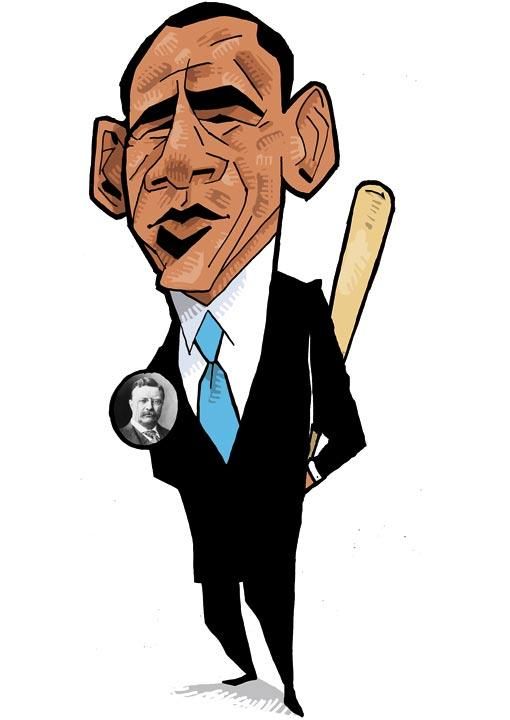Barack Obama is often compared to Franklin Delano Roosevelt, but it is from the book of another Roosevelt that he has taken a leaf: Theodore Roosevelt, who, 108 years ago, advised his successors: "Speak softly and carry a big stick!"
Recently, the whole world saw how this is done. Obama sat in the Oval Office side by side with Benjamin Netanyahu and spoke to the journalists. He was earnest, but relaxed. The body language spoke clearly: while Netanyahu leaned forward assiduously, like a travelling salesman peddling his merchandise, Obama leaned back, tranquil and self-assured.
He spoke softly, very softly. But leaning against the wall behind him, hidden by the flag, was a very big stick indeed.
Coming home, Netanyahu strenuously tried to present the meeting as a great success. But after the spotlights turned off and the red carpet rolled up, we can examine what we have really seen and heard.
Among his great achievements, Netanyahu emphasised the Iranian issue. "We have reached complete agreement," he proudly announced time and again.
Agreement on what? On the need to prevent Iran from getting a "military nuclear capability".
Just a moment. What is that we hear, "military"? Where did this word creep up from? Until now, all Israeli governments have insisted that Iran must be prevented from acquiring any nuclear capability at all. The new formula means that the Netanyahu government now accepts Iran having a "non-military" - which is never very far from a "military" - nuclear capability.
Obama's main message concerned one issue that has returned to centre stage: colonies.
As a senior Palestinian put it: "We are negotiating about dividing the pizza, and in the meantime Israel is eating it."
It has to be repeated again and again: the colonies are a disaster for the Palestinians, a disaster for peace and a double and triple disaster for Israel. First, because their main aim is to make the establishment of a Palestinian state impossible, and thus prevent peace forever. Second, because they suck the marrow out of the Israeli economy and swallow resources that should be used to help the poor. Third: because the colonies undermine the rule of law in Israel, they spread the cancer of fascism and push the whole political system to the right.
Therefore Obama is right when he puts the colony issue ahead of everything else, even ahead of the peace negotiations. A total cessation of building in the colonies comes before anything else. When a body is bleeding, the flow has to be stopped before the disease can be treated. Otherwise the patient will die of loss of blood and there won't be any body left to treat. This is precisely the aim of Netanyahu.
This is why Netanyahu has refused to accede to the request. Otherwise his coalition would have fallen apart and he would be compelled to resign or set up an alternative coalition with Kadima. The hapless Tzipi Livni, who has not found a role in opposition, would probably jump at the opportunity.
Does Obama have a peace plan of his own? If one puts all his statements of the last few days together, it seems that he has.
When he speaks about "two states for two peoples", he practically accepts the peace plan that has by now become a worldwide consensus: as the "parameters" put forward by Bill Clinton in his last days in office, as the core of the Saudi peace proposal and as the peace plans of the Israeli peace movement (the draft peace agreement of Gush Shalom, the Geneva initiative, the Ayalon-Nusseibeh statement and more).
In short: a sovereign and viable State of Palestine side by side with Israel, the pre-1967 borders with minor and agreed exchanges of territory, the dismantling of all the colonies that will not be joined to Israel in the territory exchanges, eastern part of Occupied Jerusalem as the capital of Palestine and the western part as the capital of Israel, a mutually acceptable solution to the refugee problem, a safe passage between the West Bank and the Gaza Strip, mutual security arrangements.
In the meantime, throughout the world there is a growing consensus that the only way to get the wheels of peace moving again is for Obama to publish his peace plan and call upon both sides to accept it. If need be, in popular referendums.
He could do this in the speech he is due to deliver in Cairo during his first presidential trip to the Middle East. Not by accident, he will not come to Israel during this trip, something that is almost unprecedented for a US president.
To do this, he must be ready to take on the powerful Israeli lobby. It seems that he is ready for that. The last president who dared to do this was Dwight D. Eisenhower, who compelled Israel to give back the Sinai straight after the 1956 war. "Ike" was so popular that he was not afraid of the lobby. Obama is no less popular, and perhaps he will dare, too.
As "Teddy" Roosevelt indicated: when you have a big stick, you don't have to wave it. You can afford to speak softly.
I hope Obama will indeed speak softly - but clearly and unambiguously.
- Uri Avnery is an Israeli writer and peace activist with Gush Shalom. He is a contributor to CounterPunch's book 'The Politics of Anti-Semitism'.









